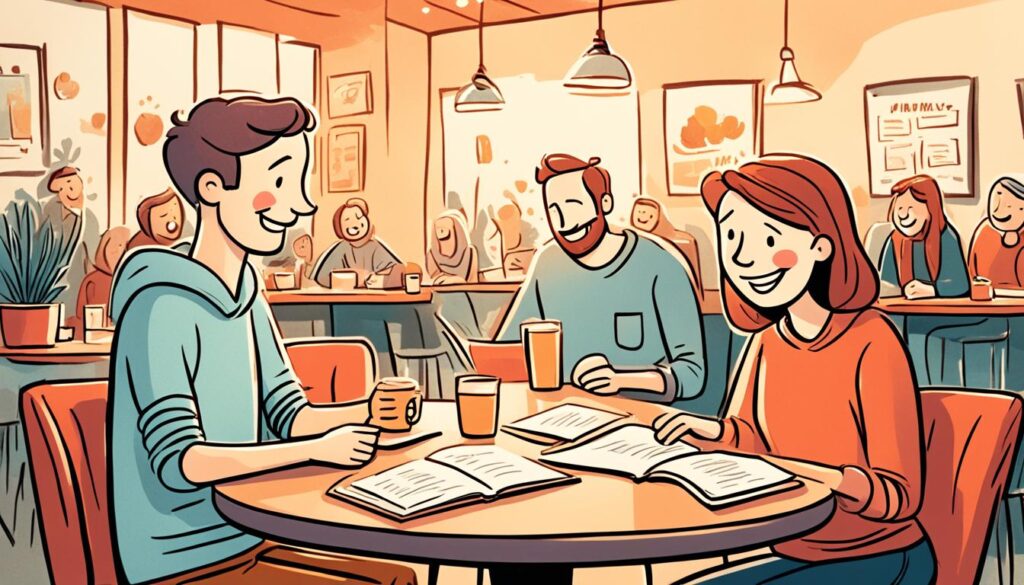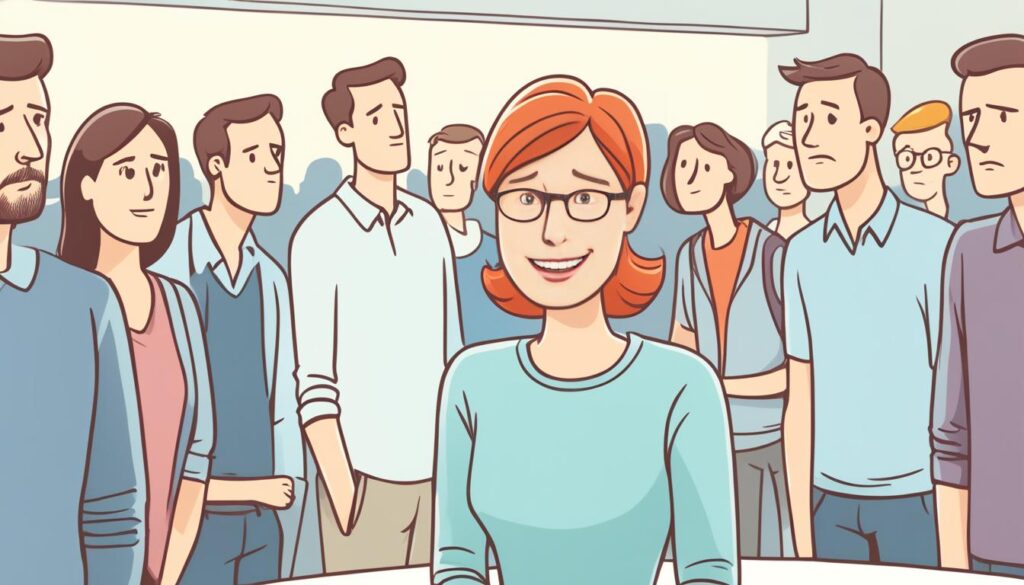Introverts have a unique perspective on socializing and group dynamics. They often value their alone time and prefer smaller, close-knit groups of friends rather than large social circles. While introverts appreciate genuine connections, navigating group dynamics and meeting the expectations of others can be challenging for them. Understanding how introverts think about having a group of friends can provide insights into their social needs and preferences.
So, what exactly do introverts think when it comes to having a group of friends? Do they enjoy the company of others or do they prefer to keep to themselves? Let’s explore this intriguing question and delve into the mindset of introverts when it comes to social interactions and forming meaningful connections.

Key Takeaways:
- Introverts value smaller, close-knit groups of friends.
- They prioritize quality over quantity in their friendships.
- One-on-one interactions are often more comfortable for introverts.
- Introverts may fear being overwhelmed in large social gatherings.
- Meeting the expectations of others in groups can cause anxiety for introverts.
Introverts Prefer Smaller, Close-Knit Groups of Friends
Introverts tend to gravitate towards smaller, close-knit groups of friends. These groups typically consist of a few individuals whom introverts feel comfortable and connected with. For example, introverts may have a small group of close friends from high school or college, or they may form intimate friendships with a select few colleagues at work. In these smaller groups, introverts can engage in meaningful conversations, provide mutual support, and feel a sense of belonging.
Examples of Small, Close-Knit Groups
To illustrate introverts’ preference for smaller, close-knit groups, let’s consider a few examples:
- A group of introverts who meet regularly at a local coffee shop to discuss books, films, and their personal experiences.
- A close-knit circle of introverted friends who enjoy hiking together and exploring nature, providing support and companionship along the way.
- A small group of introverted coworkers who frequently have lunch together and engage in deep conversations about work and life.
In these examples, the emphasis is not on the number of friends, but rather on the quality of the relationships and the opportunity for intimate conversations and support.
| Advantages of small, close-knit groups for introverts | Challenges of small, close-knit groups for introverts |
|---|---|
|
|
Quality Over Quantity
Prioritizing Meaningful Connections
Introverts understand the importance of quality friendships over quantity. They value meaningful connections built on deep conversations, shared interests, and mutual trust. Rather than having a large number of acquaintances, introverts prioritize nurturing a few close friendships. These close friendships provide introverts with a sense of belonging, allowing them to be their authentic selves and feel understood.
Introverts find fulfillment in these deeper connections, as they allow for more meaningful interactions and a greater sense of trust. Instead of pursuing superficial relationships, introverts prefer to invest their time and energy into cultivating strong bonds with a select few individuals.
For example, imagine a group of three introverted friends who regularly meet for coffee and engage in deep conversations about their personal goals, interests, and dreams. They trust one another with their vulnerabilities and provide support and encouragement in a way that is unique to their close-knit circle. This quality friendship brings immense joy and fulfillment to each individual involved.

| Benefits of Quality Friendships for Introverts |
|---|
| 1. Emotional support and understanding |
| 2. Engaging in deep, meaningful conversations |
| 3. Shared interests and hobbies |
| 4. Building trust and authenticity |
| 5. Feeling valued and appreciated |
A table illustrating the benefits of quality friendships for introverts. These benefits further emphasize the importance of prioritizing meaningful connections over a larger social network.
One-On-One Interactions Are Easier Than Groups
Introverts often find one-on-one interactions to be more comfortable and meaningful than group settings. Engaging in conversations on a one-on-one basis provides introverts with an opportunity to establish deeper connections and truly delve into topics that matter to them. Unlike large social gatherings where small talk and superficial interactions dominate, one-on-one interactions allow introverts to engage in more genuine and authentic conversations.
Imagine this scenario: You meet up with a close friend at your favorite coffee shop. As you sit down together, you both dive into a heartfelt conversation about your dreams, fears, and passions. The intimate setting and undivided attention create a space where you feel comfortable opening up and expressing yourself. In this one-on-one interaction, both of you connect on a deeper level, fostering a sense of trust and understanding.
One-on-one interactions provide introverts with the opportunity to listen attentively, engage in deep discussions, and share their own thoughts and experiences. These meaningful conversations allow introverts to establish a sense of connection and build stronger relationships with others.
Examples of Comfortable One-On-One Interactions
Here are some examples of comfortable one-on-one interactions that introverts may prefer:
- Meeting a close friend for a quiet dinner and engaging in deep conversations about life, dreams, and aspirations.
- Taking a relaxing walk in the park with a partner and having meaningful discussions about shared interests and values.
- Having a one-on-one mentoring session with a trusted colleague or advisor, where introverts can seek guidance and share insights without feeling overwhelmed by a larger group.
- Participating in a book club with a small group of like-minded individuals, where introverts can engage in thoughtful discussions about literature and ideas.
- Having a heart-to-heart conversation over a cup of tea with a family member or loved one, discussing personal matters and offering support and understanding.
These one-on-one interactions allow introverts to create deeper connections, engage in conversations aligned with their interests, and establish a sense of comfort and trust.
Fear of Being Overwhelmed in Large Groups
Introverts often experience a fear of being overwhelmed in large groups. The noise, constant socializing, and crowded environments can be draining and anxiety-inducing for introverts. They may feel a sense of sensory overload and struggle to maintain their energy and focus. This fear of being overwhelmed can impact their desire to participate in large social gatherings and influence their preference for smaller, more intimate settings where they feel more at ease.
Overwhelming Situations for Introverts
For introverts, certain situations in large groups can be particularly overwhelming:
- Parties or events with loud music and multiple conversations happening simultaneously
- Crowded venues or busy public spaces with little personal space
- Networking events or conferences with numerous unfamiliar faces
- Team-building activities that require extensive social interactions
These overwhelming situations can trigger social anxiety and make it challenging for introverts to fully engage in social interactions. They may feel the need to withdraw or find solace in quieter environments.
Image:

Worry About Meeting Expectations in Groups
Introverts often worry about meeting the expectations of others in group settings. The social dynamics of a group can be daunting for introverts who prefer quieter, more introspective environments. In social settings, they may feel pressure to be more outgoing, talkative, or extroverted, which can lead to feelings of anxiety and discomfort. The fear of not meeting these expectations may influence introverts’ thoughts on having a group of friends and affect their level of comfort in social situations.
Meeting expectations in social settings can be challenging for introverts, but it’s important to remember that everyone’s social needs and preferences differ. Some introverts may find ways to navigate group dynamics and find meaningful connections within larger gatherings, while others may feel more at ease in smaller, intimate settings. Understanding and respecting these differences can foster a more inclusive and supportive social environment for introverts and extroverts alike.
Meeting expectations in groups can create social anxiety for introverts. They may worry about being judged or not fitting in, which can further contribute to their discomfort in these settings. Recognizing and addressing these concerns can help introverts build confidence in social situations and find strategies that work for them.
Finding “Their People” Is Important
Introverts understand the importance of finding “their people” – individuals who share their interests, values, and perspectives. For introverts, connecting with like-minded individuals who understand and appreciate their introverted nature is essential.
Creating meaningful connections with others who have similar preferences for quiet and meaningful interactions allows introverts to feel a sense of belonging and support.
For example, introverts may actively seek out communities or groups centered around their hobbies or passions. By joining these communities, introverts can connect with others who share their interests and engage in activities that foster meaningful interactions.

Examples of Finding Like-Minded Individuals
Here are some examples of how introverts can find like-minded individuals and cultivate meaningful connections:
- Joining online forums or social media groups focused on specific topics or interests, such as photography, literature, or mindfulness.
- Participating in local meetups or interest-based events, such as book clubs, hiking groups, or art workshops.
- Attending conferences or conventions related to their passion or field of interest.
| Benefits of Finding Like-Minded Individuals: | How It Supports Introverts: |
|---|---|
| 1. | Validation and Understanding |
| 2. | Shared Interests and Activities |
| 3. | Reduced Social Anxiety |
| 4. | Meaningful Conversations |
| 5. | Increased Social Support |
Appreciation for Low-Key Group Activities
Introverts often find solace and enjoyment in low-key group activities that provide a relaxed and comfortable socializing experience. These types of gatherings allow introverts to engage in meaningful conversations and form deeper connections with their friends in a quieter and less stimulating environment.
One example of a low-key group activity that introverts may appreciate is a board game night. This type of gathering typically takes place in a cozy setting, such as someone’s home, where friends can come together to play their favorite board games. It offers a perfect opportunity for introverts to bond with others over a shared interest and engage in friendly competition while enjoying each other’s company.
| Benefits of Board Game Nights for Introverts |
|---|
| 1. Promotes meaningful interactions and conversations |
| 2. Creates a relaxed and comfortable atmosphere |
| 3. Allows introverts to showcase their strategic thinking and problem-solving skills |
| 4. Fosters a sense of camaraderie and shared experiences |
Another enjoyable low-key group activity for introverts is a movie marathon. This involves gathering with friends to watch a series of movies, creating a cozy and intimate atmosphere. Movie marathons provide introverts with an opportunity to relax, unwind, and enjoy quality time with their friends. The shared experience of watching movies together can spark interesting discussions and create lasting memories.
| Benefits of Movie Marathons for Introverts |
|---|
| 1. Allows introverts to enjoy a shared experience without constant social interaction |
| 2. Provides a comfortable and relaxed setting for socializing |
| 3. Allows introverts to escape into the world of movies and immerse themselves in storytelling |
| 4. Encourages discussions and conversations about the movies watched |
The key aspect of these low-key group activities is the emphasis on creating an environment that aligns with introverts’ preference for deeper connections and relaxed settings. Whether it’s engaging in strategic board games or enjoying a movie marathon, introverts can cultivate meaningful relationships and socialize in a way that caters to their unique social needs.
Recharging Requires Solo Time
Introverts have a unique need for alone time to recharge their energy and regain a sense of balance. This solo time allows introverts to process their thoughts, engage in self-reflection, and find solace in their personal space. For introverts, recharging is an essential component of their mental and emotional well-being.

Examples of how introverts recharge can vary, but often involve activities that promote introspection and solitude. Some introverts prefer to indulge in a good book, immersing themselves in a world of words and ideas. Others find solace in going for long walks alone, allowing their mind to wander and find clarity. Engaging in hobbies or creative pursuits that provide a sense of fulfillment and inner peace is another way introverts recharge their energy.
Examples of Introverts Recharging:
- Reading books that transport you to different worlds and perspectives.
- Going for long walks in nature, allowing your thoughts to flow freely.
- Engaging in artistic or creative activities, such as painting or writing.
- Practicing meditation or mindfulness to cultivate inner calm and clarity.
- Enjoying a quiet cup of tea or coffee, savoring the moment of stillness.
These examples illustrate the various ways introverts find solace and recharge in their alone time. It’s through these moments of self-reflection and personal space that introverts can replenish their energy and be ready to engage with the world around them on their own terms.
Finding a Balance of Group and Solo Activities
Striking a Balance for Introverts
As an introvert, it’s important to find a balance between participating in group activities and engaging in solo pursuits. While social connections are valuable, you also need time alone to recharge and reflect. Striking this balance allows you to meet your social needs while taking care of your personal needs for self-care and rejuvenation.
One way to achieve this balance is by scheduling both group and solo activities into your routine. Here’s how:
- Plan regular group outings with your friends or join social clubs or organizations that align with your interests. These activities provide opportunities for social interaction and meaningful connections with others.
- Set aside designated solo time in your schedule where you can engage in activities that bring you joy and allow for introspection. Whether it’s reading a book, taking a long walk, or pursuing a hobby, these moments of solitude are essential for recharging your energy.
- Communicate your needs to your friends and loved ones. Let them know that while you value their company, you also require time alone to thrive. By expressing your needs, you can ensure that your social interactions are balanced and fulfilling.
Finding a balance between group and solo activities enables you to navigate your social relationships in a way that aligns with your introverted nature and supports your overall well-being. Remember, it’s not about completely avoiding groups or isolating yourself; it’s about honoring your personal preferences and creating a lifestyle that allows you to maintain a healthy equilibrium.
FAQ
What do introverts think of having a group of friends?
Introverts tend to prefer smaller, close-knit groups of friends rather than large social circles. They value meaningful connections and often find it more comfortable to interact with others one-on-one or in smaller settings.
Why do introverts prefer smaller, close-knit groups of friends?
Introverts feel more at ease and connected in smaller groups where they can engage in intimate conversations, provide support, and feel a sense of belonging. These smaller groups allow for deeper connections and a more fulfilling social experience.
Do introverts prioritize quality over quantity when it comes to friendships?
Yes, introverts value meaningful connections and genuine friendships over a large number of acquaintances. They focus on nurturing a few close friendships where they can be their authentic selves and feel understood.
Are one-on-one interactions easier for introverts than group settings?
Yes, introverts often find one-on-one interactions more comfortable than large group settings. These interactions allow for deeper conversations and a more meaningful connection with others.
Do introverts feel overwhelmed in large groups?
Yes, introverts may experience a fear of being overwhelmed in large groups. The noise, constant socializing, and crowded environments can be draining and anxiety-inducing for introverts.
Why do introverts worry about meeting expectations in groups?
Introverts may feel pressured to be more outgoing or talkative in group settings, which can lead to feelings of anxiety and discomfort. Meeting the social expectations of a group can be challenging for introverts.
Do introverts seek out like-minded individuals?
Yes, introverts place importance on finding individuals who share their interests, values, and perspectives. They actively seek out like-minded people to form connections based on mutual understanding and support.
What kind of group activities do introverts appreciate?
Introverts often enjoy low-key group activities that foster relaxed and comfortable socializing. Examples include board game nights, movie marathons, or small dinner parties with meaningful conversations.
Why do introverts require solo time to recharge?
Introverts need alone time to recharge their energy, process their thoughts, engage in self-reflection, and relax in their own personal space. It is essential for their mental and emotional well-being.
How do introverts find a balance between group and solo activities?
Introverts strive to find a balance that allows them to meet their social needs while also taking care of their need for solitude and reflection. By finding this equilibrium, introverts can navigate their social relationships in a way that aligns with their introverted nature.